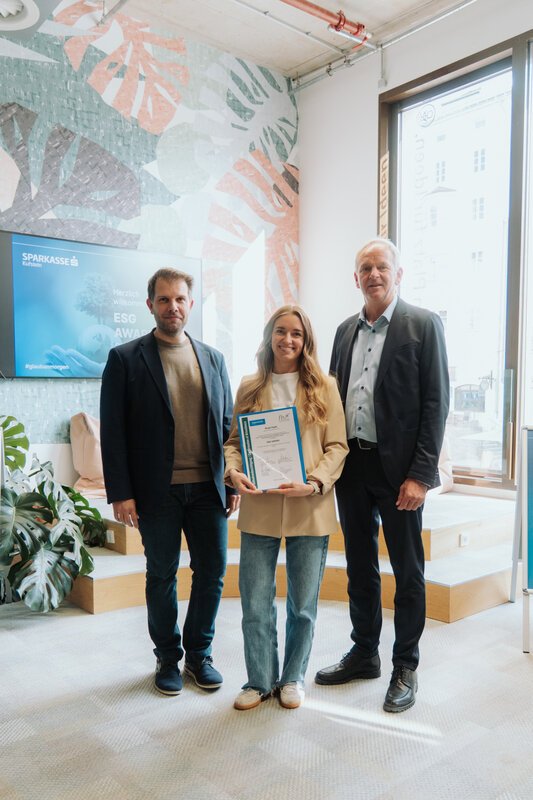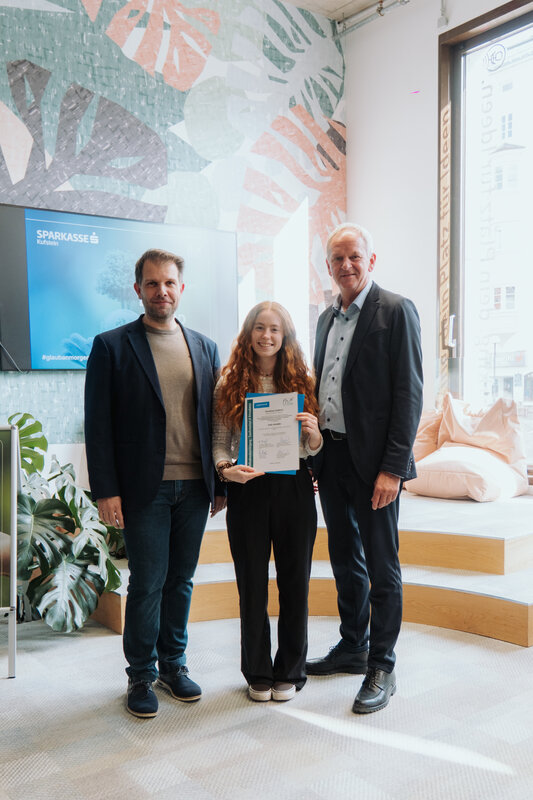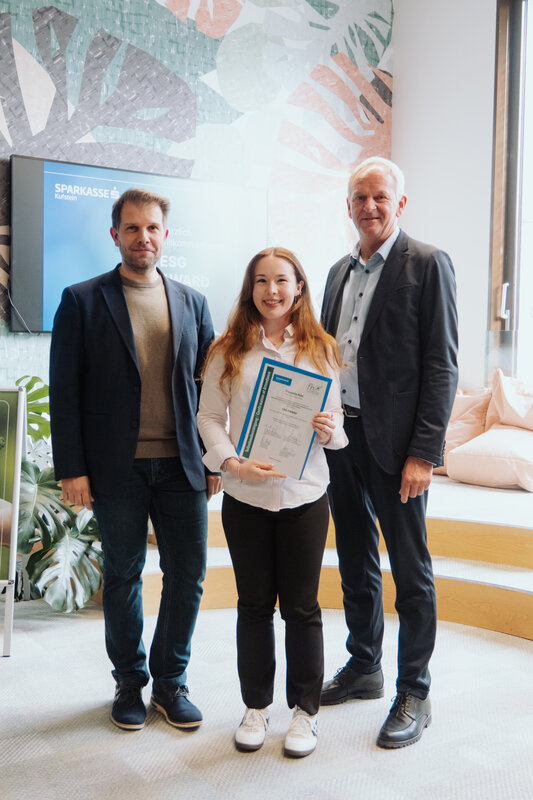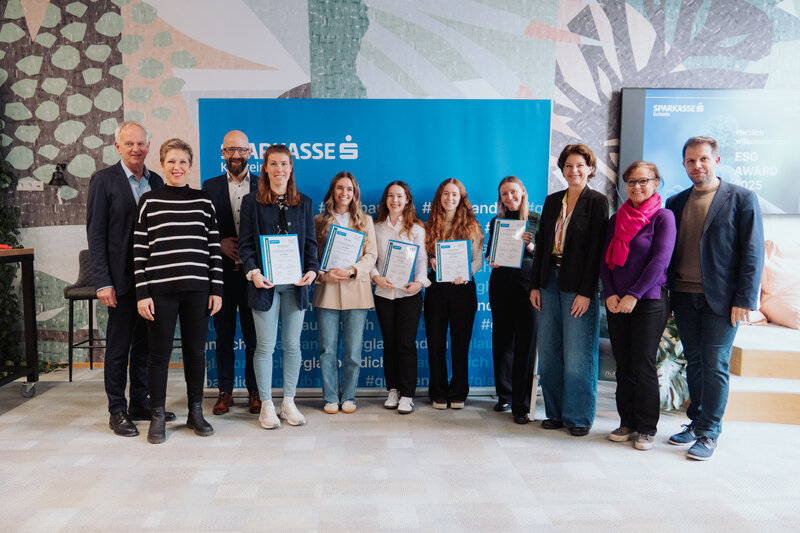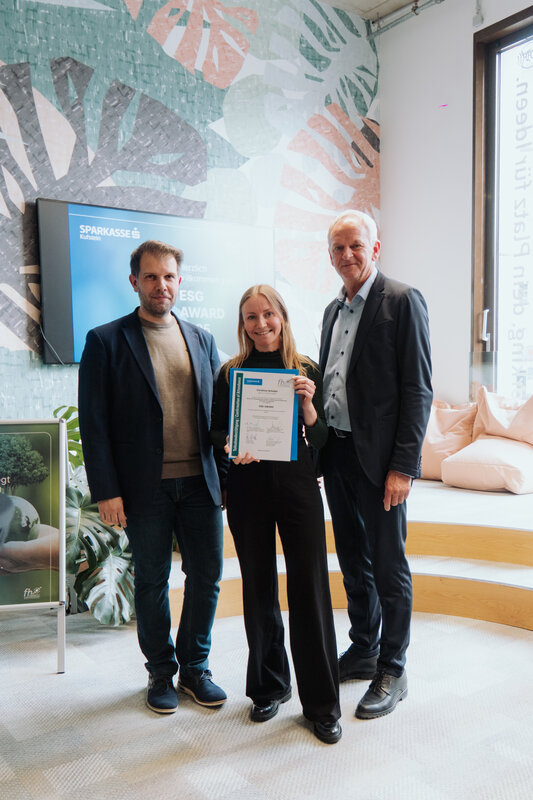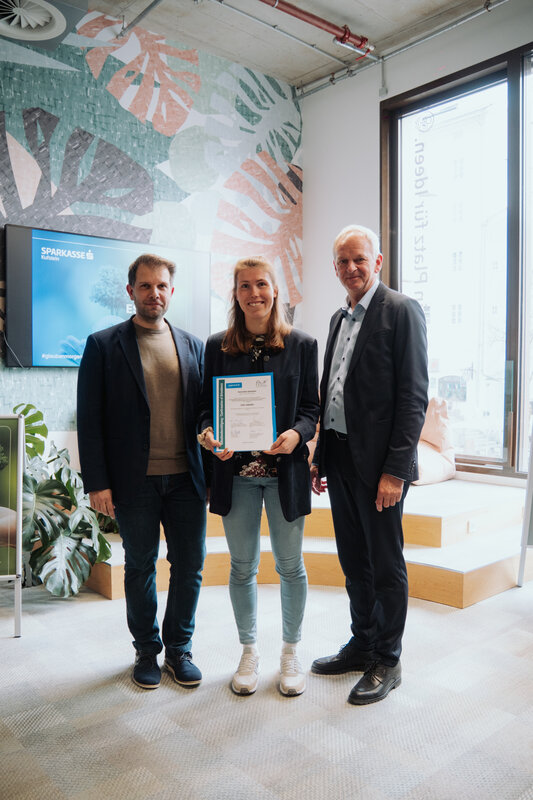First ESG Award presented at the Kufstein Uni
- 07.04.2025
- General
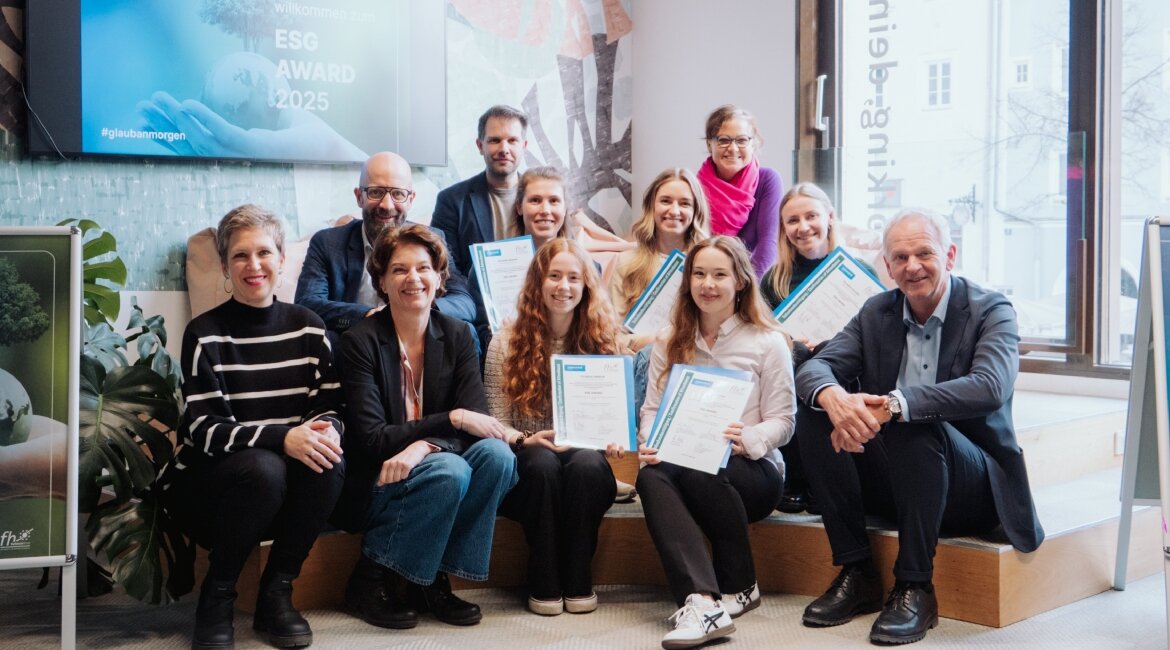
The proud winners of the ESG Award together with the jury, represented by Prof. (FH) Dr. Kristina Kampfer (front row, first from left) and Mag. (FH) Hannes Widmann (second row, first from left). Also in the picture: Asc. Prof. (FH) Mag. Monika Kohlhofer (front row, second from left), Dir. Klaus Felderer (first row, right) as well as Prof. (FH) DDr. Mario Situm (third row, left) and Prof. (FH) Dr. Claudia Stura (third row, right).
Premiere for a forward-looking award: The University of Applied Sciences Kufstein Tirol and Sparkasse Kufstein honored outstanding theses dealing with environmental, social and responsible corporate governance issues with the first-ever ESG Award.
A total of 15 Bachelor theses and eleven Master theses were submitted. The winning papers were selected in a multi-stage evaluation process by a jury of experts consisting of representatives from the University of Applied Sciences Kufstein Tirol and Sparkasse Kufstein. The jury was made up of Mag. (FH) Hannes Widmann, MSc, Prof. (FH) Dr. Kristina Kampfer and Alexandra Leber, whose expertise ensured the quality assurance and fairness of the assessment.
The ESG Award was established by Sparkasse Kufstein to promote outstanding bachelor's and master's theses in the field of ESG (Environmental, Social & Governance). Theses graded as excellent or good since September 30, 2022 were eligible to participate. A total of €2,650 in prize money was awarded.
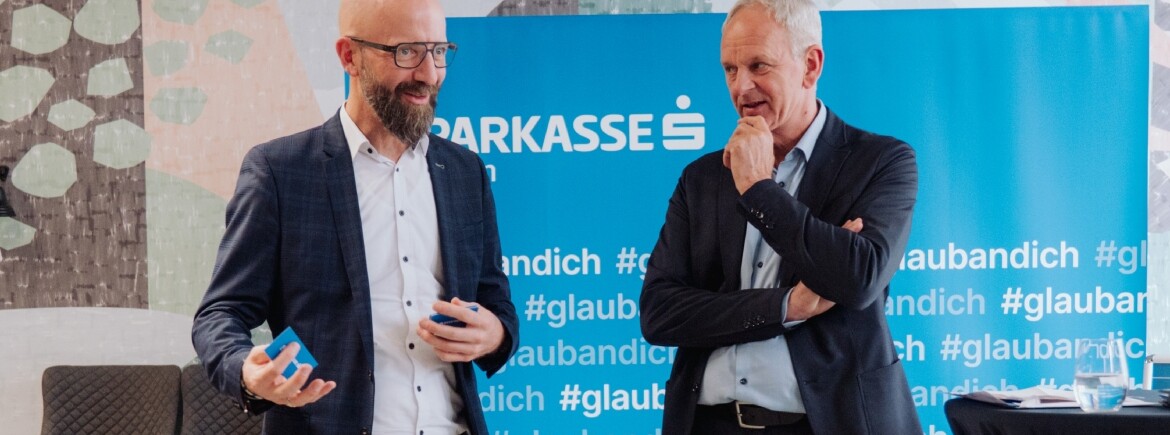
Hannes Widmann, Head of Marketing and Personnel Development at Sparkasse Kufstein (left), in conversation with Klaus Felderer, Chairman of the Board of Sparkasse Kufstein
The award ceremony took place on April 1, 2025 at the Innovationsraum Kufstein. Klaus Felderer, Chairmen of the Board of Sparkasse Kufstein, opened the event with a few words of welcome. In his speech, he addressed the current geopolitical upheavals and emphasized the immense importance of ESG topics – both for banking practice and for society as a whole. He particularly highlighted the commitment of all participants and expressed great praise for the award winners.
FACTBOX: DER EXCELLENCE AWARD BANKING & ESG
In order to continue to make the strong commitment of students visible in the future, the ESG Award and the Banking Award will now be presented under the joint name “Excellence Award Banking & ESG”. This combines the importance of both subject areas – sustainable economics and finance – in a holistic format. The 4th call for the Banking Award and the 2nd call for the ESG Award are already underway. Further information and the opportunity to submit entries can be found under the links.
Prof. (FH) DDr. Mario Situm, Director of Studies at the FH Kufstein, presented the award-winning works and called the prizewinners to the stage. According to Situm, the diversity and depth of the topics submitted shows how intensively students are already dealing with issues of sustainability and social responsibility.
AWARD WINNERS OF BACHELOR THESES:
1st place: Franziska Pohl (degree program in Sports, Culture & Event Management)
Expectations and Satisfaction of Generation Z Event Attendees with Green Event Practices at Music Festivals
Pohl's work hit a nerve with its analysis of the expectations of young festival visitors. Using focus groups at the Frequency Festival, it showed how important ecological measures are for Generation Z – even if the festival experience comes first. In any case, a minimum level of environmental awareness is expected, for example through waste separation or deposit systems. According to the participants, simple, visible measures are particularly effective. The work shows how sustainability can be subtly but effectively integrated into event concepts.
2nd place: Christina Haderer (Sports, Culture & Event Management)
Motive von ehrenamtlich Engagierten und ihr Einfluss auf eine langfristige Verbleibentscheidung im Non-Profit-Bereich
In her work, Haderer uses the Austrian mountain rescue service to highlight the challenge of securing long-term voluntary commitment. Her well-founded survey shows that, in addition to altruistic values, the motivation to understand – i.e. learning and personal development – is crucial for the commitment of volunteers. From this, she derives specific recommendations for the management of non-profit organizations, which should respond more strongly to individual motivations.
3rd place: Birgit Pajek (Marketing & Communication Management)
Zwischen Täuschung und ehrlicher Nachhaltigkeit: Greenwashing und Green Marketing in der Fast-Fashion-Industrie
Greenwashing in the fashion industry is the central topic of this work. Using a survey of 450 participants, Pajek shows how consumers respond to sustainability communication and how sensitively they react to misleading statements. Brands that position themselves transparently and authentically are assessed more positively in the long term. The work provides valuable insights for marketers and advocates a clear legal framework against greenwashing.
AWARD WINNERS OF MASTER'S THESES:
1st place: Veronika Gassner (International Business Studies)
SME Sustainability Reporting at EU Level: A Proposal Based on an Analysis of German Small and Medium-sized Entities’ Reporting Patterns
This paper focuses on how SMEs can meet the increasing requirements of EU sustainability reporting in the future. Gassner analyzed exemplary reports from English companies and, based on this, developed a compact, practical model that is specifically tailored to the needs of small businesses. Her concept not only promotes transparency, but also competitiveness – and thus makes a valuable contribution to the practical implementation of the CSRD guideline.
2nd place: Helena Jovanovic (International Business Studies)
Evaluation of the Financial and Sustainability related Performance of Europe’s Leading Airlines 2020–2022
Jovanovic used a combined analytical approach to examine the economic and sustainable performance of European airlines. In addition to classic financial indicators, she analyzed ESG indicators and developed a ranking using the TOPSIS procedure. Although there was no strong correlation between ESG and profitability, there was a negative correlation at high ESG risk. Her work argues for more transparency and consistency in companies' ESG reporting.
3rd place: Christina Schoder (Energy & Sustainability Management)
Hürden und Lösungswege beim Ausbau von Windenergie auf bestehender Infrastruktur in Skigebieten
The idea of using wind power on existing infrastructures in ski resorts is the focus of this innovative master's thesis. Schoder examined the feasibility, social acceptance and economic viability of such projects. Her conclusion: technically feasible, ecologically sensible – but currently still difficult from an economic point of view. Her recommendations are aimed at achieving better funding models, targeted research and the sustainable use of Alpine energy potential.
We congratulate all participants and award winners – their commitment to a sustainable future is inspiring and deserves the highest recognition.
Links:
- Excellence Award Banking & ESG-Award | Event series


